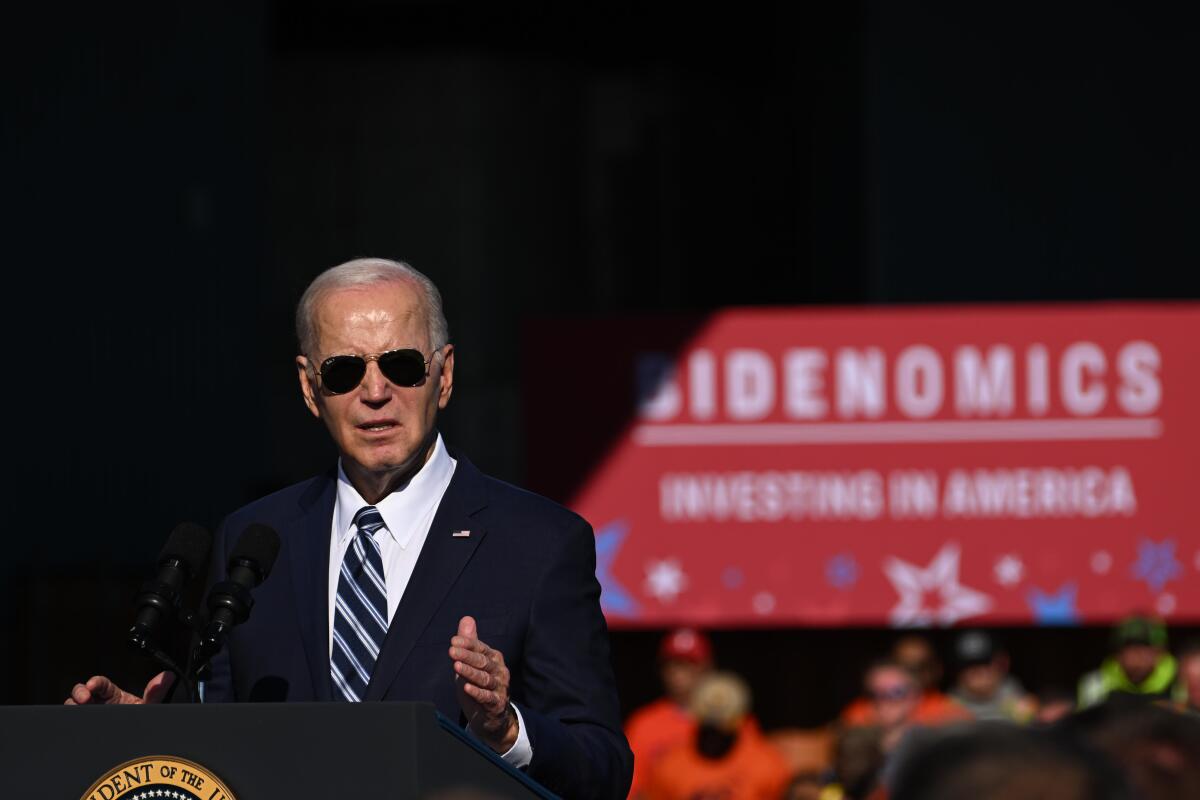Voters, worried about inflation, are favoring Trump in swing states, poll shows

Former President Trump narrowly leads President Biden in six of the seven states considered key in this year’s election rematch, an advantage powered by the perception that the Republican challenger would do a better job controlling inflation, according to a poll released Thursday.
Trump’s overall advantage in the seven states stands at 47% to 44%, a margin that grows to 5 percentage points in a five-way contest that includes independent candidates Robert F. Kennedy Jr. and Cornel West and Green Party nominee Jill Stein, according to the Swing State Survey, overseen by the Cook Political Report and two polling firms.
Trump’s lead in the head-to-head contest is a modest one: at or less than the margin of sampling error in four of the states — Arizona, Georgia, Michigan and Pennsylvania.
President Biden’s push to expand semiconductor and green technology manufacturing has poured billions into battleground states like Arizona.
The Republican holds wider leads in Nevada and North Carolina — 9% and 7%, respectively — while he and Biden are tied at 45% each in Wisconsin, the poll found.
While inflation has subsided substantially since its peak in the second half of 2022, many voters remain preoccupied with high prices. A significant majority of voters in the Cook survey think Biden has control over inflation. But just 40% in the seven swing states said they think prices will be brought under control if he wins a second term, while 56% think a Trump presidency would usher in lower inflation.
Biden’s has an advantage among voters concerned about loss of abortion rights, but the poll indicated more voters are focused on economic issues. When nearly 4,000 voters across the seven states were asked what concerns them more, Biden overseeing economic policy or Trump setting policy on abortion, 55% said they were more worried about Biden handling the economy, while 45% said Trump setting abortion policy was more concerning.
“At this point ... the defining issue for this contest is a more traditional one: the economy,” Amy Walter, editor in chief of the Cook Political Report, wrote in an analysis of the results.
“While abortion remains a strong issue for Democrats, President Biden’s advantage on the issue isn’t strong enough to offset Trump’s overall strength on bringing down the cost of living,” Walter wrote. “Biden’s overall weak position, combined with voters’ deep worry about rising costs, is currently limiting his ability to make the case that Trump is the bigger risk.”
As Biden faces off against Trump again, owning a home is challenging for voters in Nevada and Arizona, battleground states in the November election.
Both candidates face other challenges, with more potential voters, 53%, citing Biden’s “age and ability to complete his term” than the 47% who cited Trump’s “temperament and legal problems.” Biden is 81 years old; Trump is 77 and charged in four felony criminal cases.
“The race is still close because both candidates’ personal weaknesses make it hard for them to leverage the issues that should benefit them,” Walter wrote.
Trump did better in four of the seven key states in a hypothetical race including the additional candidates. The Cook survey showed the former president ahead in that scenario, 43% to 38%, with 8% saying they’d vote for Kennedy.
Joining the Cook Report in conducting the survey was BSG, a polling firm tied to Democrats, and GS Strategy Group, a firm that works mostly with Republicans. The pollsters reached voters between May 6 and May 13. Of those who responded, 85% said they were “absolutely certain” or “very likely” to vote.
More to Read
Get the L.A. Times Politics newsletter
Deeply reported insights into legislation, politics and policy from Sacramento, Washington and beyond. In your inbox three times per week.
You may occasionally receive promotional content from the Los Angeles Times.













